Refine search
No keyword found to refine search
keywords EN
Places
Names
1494 documents found
| 1 | 25 |
Documents per page :

Greening of the Paris City Hall Square
Julien Mattia / Le Pictorium
LePictorium_0308512.jpg
Greening of the Paris City Hall Square
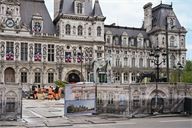
Greening of the Paris City Hall Square
Julien Mattia / Le Pictorium
LePictorium_0308513.jpg
Greening of the Paris City Hall Square

Greening of the Paris City Hall Square
Julien Mattia / Le Pictorium
LePictorium_0308514.jpg
Greening of the Paris City Hall Square

Greening of the Paris City Hall Square
Julien Mattia / Le Pictorium
LePictorium_0308515.jpg
Greening of the Paris City Hall Square
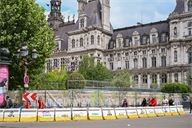
Greening of the Paris City Hall Square
Julien Mattia / Le Pictorium
LePictorium_0308516.jpg
Greening of the Paris City Hall Square

Greening of the Paris City Hall Square
Julien Mattia / Le Pictorium
LePictorium_0308517.jpg
Greening of the Paris City Hall Square
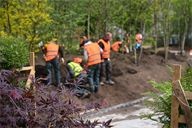
Greening of the Paris City Hall Square
Julien Mattia / Le Pictorium
LePictorium_0308518.jpg
Greening of the Paris City Hall Square
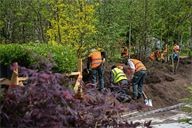
Greening of the Paris City Hall Square
Julien Mattia / Le Pictorium
LePictorium_0308519.jpg
Greening of the Paris City Hall Square

Greening of the Paris City Hall Square
Julien Mattia / Le Pictorium
LePictorium_0308520.jpg
Greening of the Paris City Hall Square

Greening of the Paris City Hall Square
Julien Mattia / Le Pictorium
LePictorium_0308521.jpg
Greening of the Paris City Hall Square

Greening of the Paris City Hall Square
Julien Mattia / Le Pictorium
LePictorium_0308522.jpg
Greening of the Paris City Hall Square
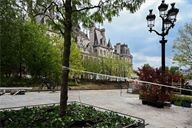
Greening of the Paris City Hall Square
Julien Mattia / Le Pictorium
LePictorium_0308523.jpg
Greening of the Paris City Hall Square

Greening of the Paris City Hall Square
Julien Mattia / Le Pictorium
LePictorium_0308524.jpg
Greening of the Paris City Hall Square

Greening of the Paris City Hall Square
Julien Mattia / Le Pictorium
LePictorium_0308525.jpg
Greening of the Paris City Hall Square
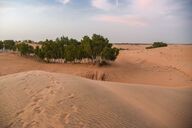
The Lompoul desert threatened by mining
Nicolas Réméné / Le Pictorium
LePictorium_0300662.jpg
View of the tents of an ecolodge located in the middle of the dunes in the Lompoul desert in Senegal, December 20, 2018. The Lompoul desert located between Dakar and Saint-Louis about 200km north of the Senegalese capital is an environmental site remarkable which attracts a large number of tourists each year. This natural space, through various tourist activities in particular, therefore plays an important role for employment and the local economy. The Lompoul desert, which is full of minerals, particularly zircon, is today threatened by mining carried out by Grande Côte Opérations (GCO), the Senegalese subsidiary of the French group Eramet. This, which began a few years ago, is already progressing a little more every day, devouring the coastal dune and undermining the entire band of casuarina trees, whose aim is to fight against coastal erosion by fixing the barrier. dune along the seafront.
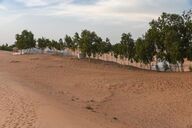
The Lompoul desert threatened by mining
Nicolas Réméné / Le Pictorium
LePictorium_0300663.jpg
View of the tents of an ecolodge located in the middle of the dunes in the Lompoul desert in Senegal, December 20, 2018. The Lompoul desert located between Dakar and Saint-Louis about 200km north of the Senegalese capital is an environmental site remarkable which attracts a large number of tourists each year. This natural space, through various tourist activities in particular, therefore plays an important role for employment and the local economy. The Lompoul desert, which is full of minerals, particularly zircon, is today threatened by mining carried out by Grande Côte Opérations (GCO), the Senegalese subsidiary of the French group Eramet. This, which began a few years ago, is already progressing a little more every day, devouring the coastal dune and undermining the entire band of casuarina trees, whose aim is to fight against coastal erosion by fixing the barrier. dune along the seafront.
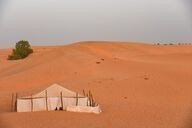
The Lompoul desert threatened by mining
Nicolas Réméné / Le Pictorium
LePictorium_0300664.jpg
View of the tents of an ecolodge located in the middle of the dunes in the Lompoul desert in Senegal, December 20, 2018. The Lompoul desert located between Dakar and Saint-Louis about 200km north of the Senegalese capital is an environmental site remarkable which attracts a large number of tourists each year. This natural space, through various tourist activities in particular, therefore plays an important role for employment and the local economy. The Lompoul desert, which is full of minerals, particularly zircon, is today threatened by mining carried out by Grande Côte Opérations (GCO), the Senegalese subsidiary of the French group Eramet. This, which began a few years ago, is already progressing a little more every day, devouring the coastal dune and undermining the entire band of casuarina trees, whose aim is to fight against coastal erosion by fixing the barrier. dune along the seafront.
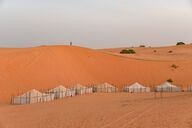
The Lompoul desert threatened by mining
Nicolas Réméné / Le Pictorium
LePictorium_0300665.jpg
View of the tents of an ecolodge located in the middle of the dunes in the Lompoul desert in Senegal, December 20, 2018. The Lompoul desert located between Dakar and Saint-Louis about 200km north of the Senegalese capital is an environmental site remarkable which attracts a large number of tourists each year. This natural space, through various tourist activities in particular, therefore plays an important role for employment and the local economy. The Lompoul desert, which is full of minerals, particularly zircon, is today threatened by mining carried out by Grande Côte Opérations (GCO), the Senegalese subsidiary of the French group Eramet. This, which began a few years ago, is already progressing a little more every day, devouring the coastal dune and undermining the entire band of casuarina trees, whose aim is to fight against coastal erosion by fixing the barrier. dune along the seafront.

The Lompoul desert threatened by mining
Nicolas Réméné / Le Pictorium
LePictorium_0300666.jpg
View of the tents of an ecolodge located in the middle of the dunes in the Lompoul desert in Senegal, December 20, 2018. The Lompoul desert located between Dakar and Saint-Louis about 200km north of the Senegalese capital is an environmental site remarkable which attracts a large number of tourists each year. This natural space, through various tourist activities in particular, therefore plays an important role for employment and the local economy. The Lompoul desert, which is full of minerals, particularly zircon, is today threatened by mining carried out by Grande Côte Opérations (GCO), the Senegalese subsidiary of the French group Eramet. This, which began a few years ago, is already progressing a little more every day, devouring the coastal dune and undermining the entire band of casuarina trees, whose aim is to fight against coastal erosion by fixing the barrier. dune along the seafront.

The Lompoul desert threatened by mining
Nicolas Réméné / Le Pictorium
LePictorium_0300667.jpg
View of the tents of an ecolodge located in the middle of the dunes in the Lompoul desert in Senegal, December 20, 2018. The Lompoul desert located between Dakar and Saint-Louis about 200km north of the Senegalese capital is an environmental site remarkable which attracts a large number of tourists each year. This natural space, through various tourist activities in particular, therefore plays an important role for employment and the local economy. The Lompoul desert, which is full of minerals, particularly zircon, is today threatened by mining carried out by Grande Côte Opérations (GCO), the Senegalese subsidiary of the French group Eramet. This, which began a few years ago, is already progressing a little more every day, devouring the coastal dune and undermining the entire band of casuarina trees, whose aim is to fight against coastal erosion by fixing the barrier. dune along the seafront.

The Lompoul desert threatened by mining
Nicolas Réméné / Le Pictorium
LePictorium_0300668.jpg
View of the tents of an ecolodge located in the middle of the dunes in the Lompoul desert in Senegal, December 20, 2018. The Lompoul desert located between Dakar and Saint-Louis about 200km north of the Senegalese capital is an environmental site remarkable which attracts a large number of tourists each year. This natural space, through various tourist activities in particular, therefore plays an important role for employment and the local economy. The Lompoul desert, which is full of minerals, particularly zircon, is today threatened by mining carried out by Grande Côte Opérations (GCO), the Senegalese subsidiary of the French group Eramet. This, which began a few years ago, is already progressing a little more every day, devouring the coastal dune and undermining the entire band of casuarina trees, whose aim is to fight against coastal erosion by fixing the barrier. dune along the seafront.
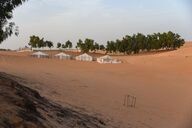
The Lompoul desert threatened by mining
Nicolas Réméné / Le Pictorium
LePictorium_0300669.jpg
View of the tents of an ecolodge located in the middle of the dunes in the Lompoul desert in Senegal, December 20, 2018. The Lompoul desert located between Dakar and Saint-Louis about 200km north of the Senegalese capital is an environmental site remarkable which attracts a large number of tourists each year. This natural space, through various tourist activities in particular, therefore plays an important role for employment and the local economy. The Lompoul desert, which is full of minerals, particularly zircon, is today threatened by mining carried out by Grande Côte Opérations (GCO), the Senegalese subsidiary of the French group Eramet. This, which began a few years ago, is already progressing a little more every day, devouring the coastal dune and undermining the entire band of casuarina trees, whose aim is to fight against coastal erosion by fixing the barrier. dune along the seafront.
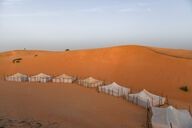
The Lompoul desert threatened by mining
Nicolas Réméné / Le Pictorium
LePictorium_0300670.jpg
View of the tents of an ecolodge located in the middle of the dunes in the Lompoul desert in Senegal, December 20, 2018. The Lompoul desert located between Dakar and Saint-Louis about 200km north of the Senegalese capital is an environmental site remarkable which attracts a large number of tourists each year. This natural space, through various tourist activities in particular, therefore plays an important role for employment and the local economy. The Lompoul desert, which is full of minerals, particularly zircon, is today threatened by mining carried out by Grande Côte Opérations (GCO), the Senegalese subsidiary of the French group Eramet. This, which began a few years ago, is already progressing a little more every day, devouring the coastal dune and undermining the entire band of casuarina trees, whose aim is to fight against coastal erosion by fixing the barrier. dune along the seafront.
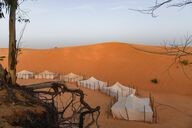
The Lompoul desert threatened by mining
Nicolas Réméné / Le Pictorium
LePictorium_0300671.jpg
View of the tents of an ecolodge located in the middle of the dunes in the Lompoul desert in Senegal, December 20, 2018. The Lompoul desert located between Dakar and Saint-Louis about 200km north of the Senegalese capital is an environmental site remarkable which attracts a large number of tourists each year. This natural space, through various tourist activities in particular, therefore plays an important role for employment and the local economy. The Lompoul desert, which is full of minerals, particularly zircon, is today threatened by mining carried out by Grande Côte Opérations (GCO), the Senegalese subsidiary of the French group Eramet. This, which began a few years ago, is already progressing a little more every day, devouring the coastal dune and undermining the entire band of casuarina trees, whose aim is to fight against coastal erosion by fixing the barrier. dune along the seafront.
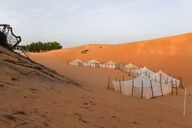
The Lompoul desert threatened by mining
Nicolas Réméné / Le Pictorium
LePictorium_0300672.jpg
View of the tents of an ecolodge located in the middle of the dunes in the Lompoul desert in Senegal, December 20, 2018. The Lompoul desert located between Dakar and Saint-Louis about 200km north of the Senegalese capital is an environmental site remarkable which attracts a large number of tourists each year. This natural space, through various tourist activities in particular, therefore plays an important role for employment and the local economy. The Lompoul desert, which is full of minerals, particularly zircon, is today threatened by mining carried out by Grande Côte Opérations (GCO), the Senegalese subsidiary of the French group Eramet. This, which began a few years ago, is already progressing a little more every day, devouring the coastal dune and undermining the entire band of casuarina trees, whose aim is to fight against coastal erosion by fixing the barrier. dune along the seafront.
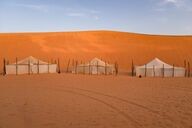
The Lompoul desert threatened by mining
Nicolas Réméné / Le Pictorium
LePictorium_0300673.jpg
View of the tents of an ecolodge located in the middle of the dunes in the Lompoul desert in Senegal, December 20, 2018. The Lompoul desert located between Dakar and Saint-Louis about 200km north of the Senegalese capital is an environmental site remarkable which attracts a large number of tourists each year. This natural space, through various tourist activities in particular, therefore plays an important role for employment and the local economy. The Lompoul desert, which is full of minerals, particularly zircon, is today threatened by mining carried out by Grande Côte Opérations (GCO), the Senegalese subsidiary of the French group Eramet. This, which began a few years ago, is already progressing a little more every day, devouring the coastal dune and undermining the entire band of casuarina trees, whose aim is to fight against coastal erosion by fixing the barrier. dune along the seafront.
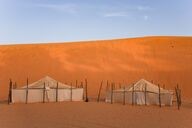
The Lompoul desert threatened by mining
Nicolas Réméné / Le Pictorium
LePictorium_0300674.jpg
View of the tents of an ecolodge located in the middle of the dunes in the Lompoul desert in Senegal, December 20, 2018. The Lompoul desert located between Dakar and Saint-Louis about 200km north of the Senegalese capital is an environmental site remarkable which attracts a large number of tourists each year. This natural space, through various tourist activities in particular, therefore plays an important role for employment and the local economy. The Lompoul desert, which is full of minerals, particularly zircon, is today threatened by mining carried out by Grande Côte Opérations (GCO), the Senegalese subsidiary of the French group Eramet. This, which began a few years ago, is already progressing a little more every day, devouring the coastal dune and undermining the entire band of casuarina trees, whose aim is to fight against coastal erosion by fixing the barrier. dune along the seafront.
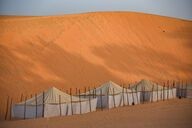
The Lompoul desert threatened by mining
Nicolas Réméné / Le Pictorium
LePictorium_0300675.jpg
View of the tents of an ecolodge located in the middle of the dunes in the Lompoul desert in Senegal, December 20, 2018. The Lompoul desert located between Dakar and Saint-Louis about 200km north of the Senegalese capital is an environmental site remarkable which attracts a large number of tourists each year. This natural space, through various tourist activities in particular, therefore plays an important role for employment and the local economy. The Lompoul desert, which is full of minerals, particularly zircon, is today threatened by mining carried out by Grande Côte Opérations (GCO), the Senegalese subsidiary of the French group Eramet. This, which began a few years ago, is already progressing a little more every day, devouring the coastal dune and undermining the entire band of casuarina trees, whose aim is to fight against coastal erosion by fixing the barrier. dune along the seafront.
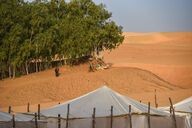
The Lompoul desert threatened by mining
Nicolas Réméné / Le Pictorium
LePictorium_0300676.jpg
View of the tents of an ecolodge located in the middle of the dunes in the Lompoul desert in Senegal, December 20, 2018. The Lompoul desert located between Dakar and Saint-Louis about 200km north of the Senegalese capital is an environmental site remarkable which attracts a large number of tourists each year. This natural space, through various tourist activities in particular, therefore plays an important role for employment and the local economy. The Lompoul desert, which is full of minerals, particularly zircon, is today threatened by mining carried out by Grande Côte Opérations (GCO), the Senegalese subsidiary of the French group Eramet. This, which began a few years ago, is already progressing a little more every day, devouring the coastal dune and undermining the entire band of casuarina trees, whose aim is to fight against coastal erosion by fixing the barrier. dune along the seafront.
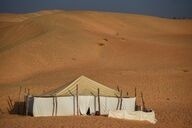
The Lompoul desert threatened by mining
Nicolas Réméné / Le Pictorium
LePictorium_0300677.jpg
View of the tents of an ecolodge located in the middle of the dunes in the Lompoul desert in Senegal, December 20, 2018. The Lompoul desert located between Dakar and Saint-Louis about 200km north of the Senegalese capital is an environmental site remarkable which attracts a large number of tourists each year. This natural space, through various tourist activities in particular, therefore plays an important role for employment and the local economy. The Lompoul desert, which is full of minerals, particularly zircon, is today threatened by mining carried out by Grande Côte Opérations (GCO), the Senegalese subsidiary of the French group Eramet. This, which began a few years ago, is already progressing a little more every day, devouring the coastal dune and undermining the entire band of casuarina trees, whose aim is to fight against coastal erosion by fixing the barrier. dune along the seafront.
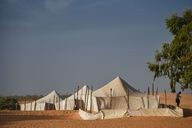
The Lompoul desert threatened by mining
Nicolas Réméné / Le Pictorium
LePictorium_0300678.jpg
View of the tents of an ecolodge located in the middle of the dunes in the Lompoul desert in Senegal, December 20, 2018. The Lompoul desert located between Dakar and Saint-Louis about 200km north of the Senegalese capital is an environmental site remarkable which attracts a large number of tourists each year. This natural space, through various tourist activities in particular, therefore plays an important role for employment and the local economy. The Lompoul desert, which is full of minerals, particularly zircon, is today threatened by mining carried out by Grande Côte Opérations (GCO), the Senegalese subsidiary of the French group Eramet. This, which began a few years ago, is already progressing a little more every day, devouring the coastal dune and undermining the entire band of casuarina trees, whose aim is to fight against coastal erosion by fixing the barrier. dune along the seafront.
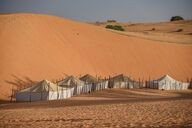
The Lompoul desert threatened by mining
Nicolas Réméné / Le Pictorium
LePictorium_0300679.jpg
View of the tents of an ecolodge located in the middle of the dunes in the Lompoul desert in Senegal, December 20, 2018. The Lompoul desert located between Dakar and Saint-Louis about 200km north of the Senegalese capital is an environmental site remarkable which attracts a large number of tourists each year. This natural space, through various tourist activities in particular, therefore plays an important role for employment and the local economy. The Lompoul desert, which is full of minerals, particularly zircon, is today threatened by mining carried out by Grande Côte Opérations (GCO), the Senegalese subsidiary of the French group Eramet. This, which began a few years ago, is already progressing a little more every day, devouring the coastal dune and undermining the entire band of casuarina trees, whose aim is to fight against coastal erosion by fixing the barrier. dune along the seafront.
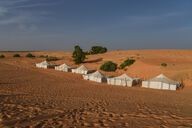
The Lompoul desert threatened by mining
Nicolas Réméné / Le Pictorium
LePictorium_0300680.jpg
View of the tents of an ecolodge located in the middle of the dunes in the Lompoul desert in Senegal, December 20, 2018. The Lompoul desert located between Dakar and Saint-Louis about 200km north of the Senegalese capital is an environmental site remarkable which attracts a large number of tourists each year. This natural space, through various tourist activities in particular, therefore plays an important role for employment and the local economy. The Lompoul desert, which is full of minerals, particularly zircon, is today threatened by mining carried out by Grande Côte Opérations (GCO), the Senegalese subsidiary of the French group Eramet. This, which began a few years ago, is already progressing a little more every day, devouring the coastal dune and undermining the entire band of casuarina trees, whose aim is to fight against coastal erosion by fixing the barrier. dune along the seafront.
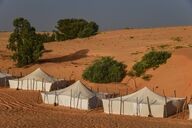
The Lompoul desert threatened by mining
Nicolas Réméné / Le Pictorium
LePictorium_0300681.jpg
View of the tents of an ecolodge located in the middle of the dunes in the Lompoul desert in Senegal, December 20, 2018. The Lompoul desert located between Dakar and Saint-Louis about 200km north of the Senegalese capital is an environmental site remarkable which attracts a large number of tourists each year. This natural space, through various tourist activities in particular, therefore plays an important role for employment and the local economy. The Lompoul desert, which is full of minerals, particularly zircon, is today threatened by mining carried out by Grande Côte Opérations (GCO), the Senegalese subsidiary of the French group Eramet. This, which began a few years ago, is already progressing a little more every day, devouring the coastal dune and undermining the entire band of casuarina trees, whose aim is to fight against coastal erosion by fixing the barrier. dune along the seafront.
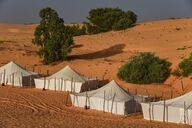
The Lompoul desert threatened by mining
Nicolas Réméné / Le Pictorium
LePictorium_0300682.jpg
View of the tents of an ecolodge located in the middle of the dunes in the Lompoul desert in Senegal, December 20, 2018. The Lompoul desert located between Dakar and Saint-Louis about 200km north of the Senegalese capital is an environmental site remarkable which attracts a large number of tourists each year. This natural space, through various tourist activities in particular, therefore plays an important role for employment and the local economy. The Lompoul desert, which is full of minerals, particularly zircon, is today threatened by mining carried out by Grande Côte Opérations (GCO), the Senegalese subsidiary of the French group Eramet. This, which began a few years ago, is already progressing a little more every day, devouring the coastal dune and undermining the entire band of casuarina trees, whose aim is to fight against coastal erosion by fixing the barrier. dune along the seafront.
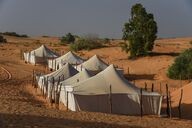
The Lompoul desert threatened by mining
Nicolas Réméné / Le Pictorium
LePictorium_0300683.jpg
View of the tents of an ecolodge located in the middle of the dunes in the Lompoul desert in Senegal, December 20, 2018. The Lompoul desert located between Dakar and Saint-Louis about 200km north of the Senegalese capital is an environmental site remarkable which attracts a large number of tourists each year. This natural space, through various tourist activities in particular, therefore plays an important role for employment and the local economy. The Lompoul desert, which is full of minerals, particularly zircon, is today threatened by mining carried out by Grande Côte Opérations (GCO), the Senegalese subsidiary of the French group Eramet. This, which began a few years ago, is already progressing a little more every day, devouring the coastal dune and undermining the entire band of casuarina trees, whose aim is to fight against coastal erosion by fixing the barrier. dune along the seafront.
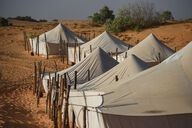
The Lompoul desert threatened by mining
Nicolas Réméné / Le Pictorium
LePictorium_0300684.jpg
View of the tents of an ecolodge located in the middle of the dunes in the Lompoul desert in Senegal, December 20, 2018. The Lompoul desert located between Dakar and Saint-Louis about 200km north of the Senegalese capital is an environmental site remarkable which attracts a large number of tourists each year. This natural space, through various tourist activities in particular, therefore plays an important role for employment and the local economy. The Lompoul desert, which is full of minerals, particularly zircon, is today threatened by mining carried out by Grande Côte Opérations (GCO), the Senegalese subsidiary of the French group Eramet. This, which began a few years ago, is already progressing a little more every day, devouring the coastal dune and undermining the entire band of casuarina trees, whose aim is to fight against coastal erosion by fixing the barrier. dune along the seafront.
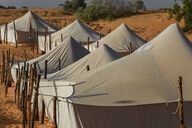
The Lompoul desert threatened by mining
Nicolas Réméné / Le Pictorium
LePictorium_0300685.jpg
View of the tents of an ecolodge located in the middle of the dunes in the Lompoul desert in Senegal, December 20, 2018. The Lompoul desert located between Dakar and Saint-Louis about 200km north of the Senegalese capital is an environmental site remarkable which attracts a large number of tourists each year. This natural space, through various tourist activities in particular, therefore plays an important role for employment and the local economy. The Lompoul desert, which is full of minerals, particularly zircon, is today threatened by mining carried out by Grande Côte Opérations (GCO), the Senegalese subsidiary of the French group Eramet. This, which began a few years ago, is already progressing a little more every day, devouring the coastal dune and undermining the entire band of casuarina trees, whose aim is to fight against coastal erosion by fixing the barrier. dune along the seafront.
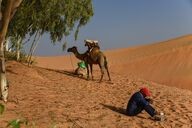
The Lompoul desert threatened by mining
Nicolas Réméné / Le Pictorium
LePictorium_0300686.jpg
A guide with his camels waits for clients at the ecolodge located in the middle of the dunes in the Lompoul desert in Senegal, December 20, 2018. The Lompoul desert located between Dakar and Saint-Louis about 200km north of the Senegalese capital is a remarkable environmental site which attracts a large number of tourists each year. This natural space, through various tourist activities in particular, therefore plays an important role for employment and the local economy. The Lompoul desert, which is full of minerals, particularly zircon, is today threatened by mining carried out by Grande Côte Opérations (GCO), the Senegalese subsidiary of the French group Eramet. This, which began a few years ago, is already progressing a little more every day, devouring the coastal dune and undermining the entire band of casuarina trees, whose aim is to fight against coastal erosion by fixing the barrier. dune along the seafront.
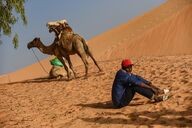
The Lompoul desert threatened by mining
Nicolas Réméné / Le Pictorium
LePictorium_0300687.jpg
A guide with his camels waits for clients at the ecolodge located in the middle of the dunes in the Lompoul desert in Senegal, December 20, 2018. The Lompoul desert located between Dakar and Saint-Louis about 200km north of the Senegalese capital is a remarkable environmental site which attracts a large number of tourists each year. This natural space, through various tourist activities in particular, therefore plays an important role for employment and the local economy. The Lompoul desert, which is full of minerals, particularly zircon, is today threatened by mining carried out by Grande Côte Opérations (GCO), the Senegalese subsidiary of the French group Eramet. This, which began a few years ago, is already progressing a little more every day, devouring the coastal dune and undermining the entire band of casuarina trees, whose aim is to fight against coastal erosion by fixing the barrier. dune along the seafront.
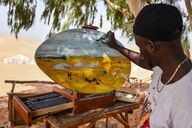
The Lompoul desert threatened by mining
Nicolas Réméné / Le Pictorium
LePictorium_0300688.jpg
Artist Dr. Ziz (Serigne Abdoul Aziz Gueye) drawing in the Lompoul desert in Senegal, December 20, 2018. The Lompoul desert located between Dakar and Saint-Louis about 200km north of the Senegalese capital is a remarkable environmental site that attracts a large number of tourists each year. This natural space, through various tourist activities in particular, therefore plays an important role for employment and the local economy. The Lompoul desert, which is full of minerals, particularly zircon, is today threatened by mining carried out by Grande Côte Opérations (GCO), the Senegalese subsidiary of the French group Eramet. This, which began a few years ago, is already progressing a little more every day, devouring the coastal dune and undermining the entire band of casuarina trees, whose aim is to fight against coastal erosion by fixing the barrier. dune along the seafront.
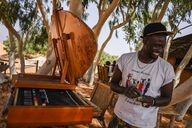
The Lompoul desert threatened by mining
Nicolas Réméné / Le Pictorium
LePictorium_0300689.jpg
Artist Dr. Ziz (Serigne Abdoul Aziz Gueye) drawing in the Lompoul desert in Senegal, December 20, 2018. The Lompoul desert located between Dakar and Saint-Louis about 200km north of the Senegalese capital is a remarkable environmental site that attracts a large number of tourists each year. This natural space, through various tourist activities in particular, therefore plays an important role for employment and the local economy. The Lompoul desert, which is full of minerals, particularly zircon, is today threatened by mining carried out by Grande Côte Opérations (GCO), the Senegalese subsidiary of the French group Eramet. This, which began a few years ago, is already progressing a little more every day, devouring the coastal dune and undermining the entire band of casuarina trees, whose aim is to fight against coastal erosion by fixing the barrier. dune along the seafront.
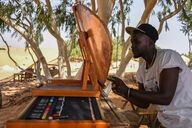
The Lompoul desert threatened by mining
Nicolas Réméné / Le Pictorium
LePictorium_0300690.jpg
Artist Dr. Ziz (Serigne Abdoul Aziz Gueye) drawing in the Lompoul desert in Senegal, December 20, 2018. The Lompoul desert located between Dakar and Saint-Louis about 200km north of the Senegalese capital is a remarkable environmental site that attracts a large number of tourists each year. This natural space, through various tourist activities in particular, therefore plays an important role for employment and the local economy. The Lompoul desert, which is full of minerals, particularly zircon, is today threatened by mining carried out by Grande Côte Opérations (GCO), the Senegalese subsidiary of the French group Eramet. This, which began a few years ago, is already progressing a little more every day, devouring the coastal dune and undermining the entire band of casuarina trees, whose aim is to fight against coastal erosion by fixing the barrier. dune along the seafront.
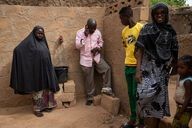
Prepaid meters and mobile application in Niger
Nicolas Réméné / Le Pictorium
LePictorium_0282565.jpg
In the Goudel Maourey district of Niamey in Niger, "smart" water meters have been installed, enabling each family to pay for its water consumption as it occurs, using a mobile phone and an application. This type of prepaid meter allows local residents to regulate their consumption according to their income. This makes it possible to offer access to drinking water at home at a lower cost, with a prepayment system adapted to the irregular incomes of a large proportion of disadvantaged urban populations. In these working-class neighbourhoods on the outskirts of the city centre, access to water is often difficult. The drinking water kiosks installed in family concessions provide access to quality running water for all daily needs. In Niamey, Niger, during the hot season, between the beginning of March and the end of May, many neighbourhoods experience water cuts several times a day, and in some outlying areas these cuts can last for several days. This makes it very difficult for residents to meet their drinking water needs. Residents are obliged to go and buy water from the fountain operators who run standpipes in the neighbourhoods. Temperatures at this time of year can reach 45-47°C, making the water shortage even more difficult.
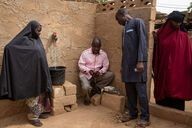
Prepaid meters and mobile application in Niger
Nicolas Réméné / Le Pictorium
LePictorium_0282566.jpg
In the Goudel Maourey district of Niamey in Niger, "smart" water meters have been installed, enabling each family to pay for its water consumption as it occurs, using a mobile phone and an application. This type of prepaid meter allows local residents to regulate their consumption according to their income. This makes it possible to offer access to drinking water at home at a lower cost, with a prepayment system adapted to the irregular incomes of a large proportion of disadvantaged urban populations. In these working-class neighbourhoods on the outskirts of the city centre, access to water is often difficult. The drinking water kiosks installed in family concessions provide access to quality running water for all daily needs. In Niamey, Niger, during the hot season, between the beginning of March and the end of May, many neighbourhoods experience water cuts several times a day, and in some outlying areas these cuts can last for several days. This makes it very difficult for residents to meet their drinking water needs. Residents are obliged to go and buy water from the fountain operators who run standpipes in the neighbourhoods. Temperatures at this time of year can reach 45-47°C, making the water shortage even more difficult.
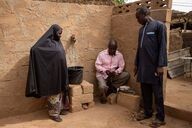
Prepaid meters and mobile application in Niger
Nicolas Réméné / Le Pictorium
LePictorium_0282567.jpg
In the Goudel Maourey district of Niamey in Niger, "smart" water meters have been installed, enabling each family to pay for its water consumption as it occurs, using a mobile phone and an application. This type of prepaid meter allows local residents to regulate their consumption according to their income. This makes it possible to offer access to drinking water at home at a lower cost, with a prepayment system adapted to the irregular incomes of a large proportion of disadvantaged urban populations. In these working-class neighbourhoods on the outskirts of the city centre, access to water is often difficult. The drinking water kiosks installed in family concessions provide access to quality running water for all daily needs. In Niamey, Niger, during the hot season, between the beginning of March and the end of May, many neighbourhoods experience water cuts several times a day, and in some outlying areas these cuts can last for several days. This makes it very difficult for residents to meet their drinking water needs. Residents are obliged to go and buy water from the fountain operators who run standpipes in the neighbourhoods. Temperatures at this time of year can reach 45-47°C, making the water shortage even more difficult.
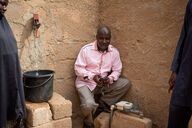
Prepaid meters and mobile application in Niger
Nicolas Réméné / Le Pictorium
LePictorium_0282568.jpg
In the Goudel Maourey district of Niamey in Niger, "smart" water meters have been installed, enabling each family to pay for its water consumption as it occurs, using a mobile phone and an application. This type of prepaid meter allows local residents to regulate their consumption according to their income. This makes it possible to offer access to drinking water at home at a lower cost, with a prepayment system adapted to the irregular incomes of a large proportion of disadvantaged urban populations. In these working-class neighbourhoods on the outskirts of the city centre, access to water is often difficult. The drinking water kiosks installed in family concessions provide access to quality running water for all daily needs. In Niamey, Niger, during the hot season, between the beginning of March and the end of May, many neighbourhoods experience water cuts several times a day, and in some outlying areas these cuts can last for several days. This makes it very difficult for residents to meet their drinking water needs. Residents are obliged to go and buy water from the fountain operators who run standpipes in the neighbourhoods. Temperatures at this time of year can reach 45-47°C, making the water shortage even more difficult.
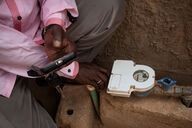
Prepaid meters and mobile application in Niger
Nicolas Réméné / Le Pictorium
LePictorium_0282569.jpg
In the Goudel Maourey district of Niamey in Niger, "smart" water meters have been installed, enabling each family to pay for its water consumption as it occurs, using a mobile phone and an application. This type of prepaid meter allows local residents to regulate their consumption according to their income. This makes it possible to offer access to drinking water at home at a lower cost, with a prepayment system adapted to the irregular incomes of a large proportion of disadvantaged urban populations. In these working-class neighbourhoods on the outskirts of the city centre, access to water is often difficult. The drinking water kiosks installed in family concessions provide access to quality running water for all daily needs. In Niamey, Niger, during the hot season, between the beginning of March and the end of May, many neighbourhoods experience water cuts several times a day, and in some outlying areas these cuts can last for several days. This makes it very difficult for residents to meet their drinking water needs. Residents are obliged to go and buy water from the fountain operators who run standpipes in the neighbourhoods. Temperatures at this time of year can reach 45-47°C, making the water shortage even more difficult.
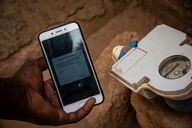
Prepaid meters and mobile application in Niger
Nicolas Réméné / Le Pictorium
LePictorium_0282570.jpg
In the Goudel Maourey district of Niamey in Niger, "smart" water meters have been installed, enabling each family to pay for its water consumption as it occurs, using a mobile phone and an application. This type of prepaid meter allows local residents to regulate their consumption according to their income. This makes it possible to offer access to drinking water at home at a lower cost, with a prepayment system adapted to the irregular incomes of a large proportion of disadvantaged urban populations. In these working-class neighbourhoods on the outskirts of the city centre, access to water is often difficult. The drinking water kiosks installed in family concessions provide access to quality running water for all daily needs. In Niamey, Niger, during the hot season, between the beginning of March and the end of May, many neighbourhoods experience water cuts several times a day, and in some outlying areas these cuts can last for several days. This makes it very difficult for residents to meet their drinking water needs. Residents are obliged to go and buy water from the fountain operators who run standpipes in the neighbourhoods. Temperatures at this time of year can reach 45-47°C, making the water shortage even more difficult.
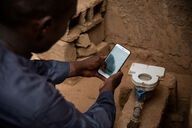
Prepaid meters and mobile application in Niger
Nicolas Réméné / Le Pictorium
LePictorium_0282571.jpg
In the Goudel Maourey district of Niamey in Niger, "smart" water meters have been installed, enabling each family to pay for its water consumption as it occurs, using a mobile phone and an application. This type of prepaid meter allows local residents to regulate their consumption according to their income. This makes it possible to offer access to drinking water at home at a lower cost, with a prepayment system adapted to the irregular incomes of a large proportion of disadvantaged urban populations. In these working-class neighbourhoods on the outskirts of the city centre, access to water is often difficult. The drinking water kiosks installed in family concessions provide access to quality running water for all daily needs. In Niamey, Niger, during the hot season, between the beginning of March and the end of May, many neighbourhoods experience water cuts several times a day, and in some outlying areas these cuts can last for several days. This makes it very difficult for residents to meet their drinking water needs. Residents are obliged to go and buy water from the fountain operators who run standpipes in the neighbourhoods. Temperatures at this time of year can reach 45-47°C, making the water shortage even more difficult.
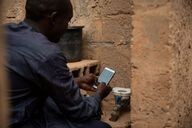
Prepaid meters and mobile application in Niger
Nicolas Réméné / Le Pictorium
LePictorium_0282572.jpg
In the Goudel Maourey district of Niamey in Niger, "smart" water meters have been installed, enabling each family to pay for its water consumption as it occurs, using a mobile phone and an application. This type of prepaid meter allows local residents to regulate their consumption according to their income. This makes it possible to offer access to drinking water at home at a lower cost, with a prepayment system adapted to the irregular incomes of a large proportion of disadvantaged urban populations. In these working-class neighbourhoods on the outskirts of the city centre, access to water is often difficult. The drinking water kiosks installed in family concessions provide access to quality running water for all daily needs. In Niamey, Niger, during the hot season, between the beginning of March and the end of May, many neighbourhoods experience water cuts several times a day, and in some outlying areas these cuts can last for several days. This makes it very difficult for residents to meet their drinking water needs. Residents are obliged to go and buy water from the fountain operators who run standpipes in the neighbourhoods. Temperatures at this time of year can reach 45-47°C, making the water shortage even more difficult.
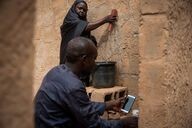
Prepaid meters and mobile application in Niger
Nicolas Réméné / Le Pictorium
LePictorium_0282573.jpg
In the Goudel Maourey district of Niamey in Niger, "smart" water meters have been installed, enabling each family to pay for its water consumption as it occurs, using a mobile phone and an application. This type of prepaid meter allows local residents to regulate their consumption according to their income. This makes it possible to offer access to drinking water at home at a lower cost, with a prepayment system adapted to the irregular incomes of a large proportion of disadvantaged urban populations. In these working-class neighbourhoods on the outskirts of the city centre, access to water is often difficult. The drinking water kiosks installed in family concessions provide access to quality running water for all daily needs. In Niamey, Niger, during the hot season, between the beginning of March and the end of May, many neighbourhoods experience water cuts several times a day, and in some outlying areas these cuts can last for several days. This makes it very difficult for residents to meet their drinking water needs. Residents are obliged to go and buy water from the fountain operators who run standpipes in the neighbourhoods. Temperatures at this time of year can reach 45-47°C, making the water shortage even more difficult.

Prepaid meters and mobile application in Niger
Nicolas Réméné / Le Pictorium
LePictorium_0282574.jpg
In the Goudel Maourey district of Niamey in Niger, "smart" water meters have been installed, enabling each family to pay for its water consumption as it occurs, using a mobile phone and an application. This type of prepaid meter allows local residents to regulate their consumption according to their income. This makes it possible to offer access to drinking water at home at a lower cost, with a prepayment system adapted to the irregular incomes of a large proportion of disadvantaged urban populations. In these working-class neighbourhoods on the outskirts of the city centre, access to water is often difficult. The drinking water kiosks installed in family concessions provide access to quality running water for all daily needs. In Niamey, Niger, during the hot season, between the beginning of March and the end of May, many neighbourhoods experience water cuts several times a day, and in some outlying areas these cuts can last for several days. This makes it very difficult for residents to meet their drinking water needs. Residents are obliged to go and buy water from the fountain operators who run standpipes in the neighbourhoods. Temperatures at this time of year can reach 45-47°C, making the water shortage even more difficult.
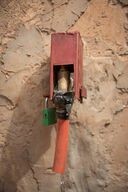
Prepaid meters and mobile application in Niger
Nicolas Réméné / Le Pictorium
LePictorium_0282575.jpg
In the Goudel Maourey district of Niamey in Niger, "smart" water meters have been installed, enabling each family to pay for its water consumption as it occurs, using a mobile phone and an application. This type of prepaid meter allows local residents to regulate their consumption according to their income. This makes it possible to offer access to drinking water at home at a lower cost, with a prepayment system adapted to the irregular incomes of a large proportion of disadvantaged urban populations. In these working-class neighbourhoods on the outskirts of the city centre, access to water is often difficult. The drinking water kiosks installed in family concessions provide access to quality running water for all daily needs. In Niamey, Niger, during the hot season, between the beginning of March and the end of May, many neighbourhoods experience water cuts several times a day, and in some outlying areas these cuts can last for several days. This makes it very difficult for residents to meet their drinking water needs. Residents are obliged to go and buy water from the fountain operators who run standpipes in the neighbourhoods. Temperatures at this time of year can reach 45-47°C, making the water shortage even more difficult.
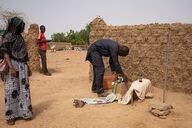
Prepaid meters and mobile application in Niger
Nicolas Réméné / Le Pictorium
LePictorium_0282576.jpg
In the Goudel Maourey district of Niamey in Niger, "smart" water meters have been installed, enabling each family to pay for its water consumption as it occurs, using a mobile phone and an application. This type of prepaid meter allows local residents to regulate their consumption according to their income. This makes it possible to offer access to drinking water at home at a lower cost, with a prepayment system adapted to the irregular incomes of a large proportion of disadvantaged urban populations. In these working-class neighbourhoods on the outskirts of the city centre, access to water is often difficult. The drinking water kiosks installed in family concessions provide access to quality running water for all daily needs. In Niamey, Niger, during the hot season, between the beginning of March and the end of May, many neighbourhoods experience water cuts several times a day, and in some outlying areas these cuts can last for several days. This makes it very difficult for residents to meet their drinking water needs. Residents are obliged to go and buy water from the fountain operators who run standpipes in the neighbourhoods. Temperatures at this time of year can reach 45-47°C, making the water shortage even more difficult.
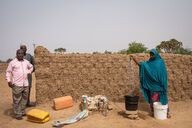
Prepaid meters and mobile application in Niger
Nicolas Réméné / Le Pictorium
LePictorium_0282577.jpg
In the Goudel Maourey district of Niamey in Niger, "smart" water meters have been installed, enabling each family to pay for its water consumption as it occurs, using a mobile phone and an application. This type of prepaid meter allows local residents to regulate their consumption according to their income. This makes it possible to offer access to drinking water at home at a lower cost, with a prepayment system adapted to the irregular incomes of a large proportion of disadvantaged urban populations. In these working-class neighbourhoods on the outskirts of the city centre, access to water is often difficult. The drinking water kiosks installed in family concessions provide access to quality running water for all daily needs. In Niamey, Niger, during the hot season, between the beginning of March and the end of May, many neighbourhoods experience water cuts several times a day, and in some outlying areas these cuts can last for several days. This makes it very difficult for residents to meet their drinking water needs. Residents are obliged to go and buy water from the fountain operators who run standpipes in the neighbourhoods. Temperatures at this time of year can reach 45-47°C, making the water shortage even more difficult.
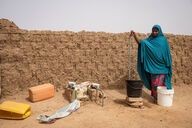
Prepaid meters and mobile application in Niger
Nicolas Réméné / Le Pictorium
LePictorium_0282578.jpg
In the Goudel Maourey district of Niamey in Niger, "smart" water meters have been installed, enabling each family to pay for its water consumption as it occurs, using a mobile phone and an application. This type of prepaid meter allows local residents to regulate their consumption according to their income. This makes it possible to offer access to drinking water at home at a lower cost, with a prepayment system adapted to the irregular incomes of a large proportion of disadvantaged urban populations. In these working-class neighbourhoods on the outskirts of the city centre, access to water is often difficult. The drinking water kiosks installed in family concessions provide access to quality running water for all daily needs. In Niamey, Niger, during the hot season, between the beginning of March and the end of May, many neighbourhoods experience water cuts several times a day, and in some outlying areas these cuts can last for several days. This makes it very difficult for residents to meet their drinking water needs. Residents are obliged to go and buy water from the fountain operators who run standpipes in the neighbourhoods. Temperatures at this time of year can reach 45-47°C, making the water shortage even more difficult.

Prepaid meters and mobile application in Niger
Nicolas Réméné / Le Pictorium
LePictorium_0282579.jpg
In the Goudel Maourey district of Niamey in Niger, "smart" water meters have been installed, enabling each family to pay for its water consumption as it occurs, using a mobile phone and an application. This type of prepaid meter allows local residents to regulate their consumption according to their income. This makes it possible to offer access to drinking water at home at a lower cost, with a prepayment system adapted to the irregular incomes of a large proportion of disadvantaged urban populations. In these working-class neighbourhoods on the outskirts of the city centre, access to water is often difficult. The drinking water kiosks installed in family concessions provide access to quality running water for all daily needs. In Niamey, Niger, during the hot season, between the beginning of March and the end of May, many neighbourhoods experience water cuts several times a day, and in some outlying areas these cuts can last for several days. This makes it very difficult for residents to meet their drinking water needs. Residents are obliged to go and buy water from the fountain operators who run standpipes in the neighbourhoods. Temperatures at this time of year can reach 45-47°C, making the water shortage even more difficult.
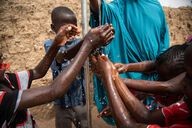
Prepaid meters and mobile application in Niger
Nicolas Réméné / Le Pictorium
LePictorium_0282580.jpg
In the Goudel Maourey district of Niamey in Niger, "smart" water meters have been installed, enabling each family to pay for its water consumption as it occurs, using a mobile phone and an application. This type of prepaid meter allows local residents to regulate their consumption according to their income. This makes it possible to offer access to drinking water at home at a lower cost, with a prepayment system adapted to the irregular incomes of a large proportion of disadvantaged urban populations. In these working-class neighbourhoods on the outskirts of the city centre, access to water is often difficult. The drinking water kiosks installed in family concessions provide access to quality running water for all daily needs. In Niamey, Niger, during the hot season, between the beginning of March and the end of May, many neighbourhoods experience water cuts several times a day, and in some outlying areas these cuts can last for several days. This makes it very difficult for residents to meet their drinking water needs. Residents are obliged to go and buy water from the fountain operators who run standpipes in the neighbourhoods. Temperatures at this time of year can reach 45-47°C, making the water shortage even more difficult.

Prepaid meters and mobile application in Niger
Nicolas Réméné / Le Pictorium
LePictorium_0282581.jpg
In the Goudel Maourey district of Niamey in Niger, "smart" water meters have been installed, enabling each family to pay for its water consumption as it occurs, using a mobile phone and an application. This type of prepaid meter allows local residents to regulate their consumption according to their income. This makes it possible to offer access to drinking water at home at a lower cost, with a prepayment system adapted to the irregular incomes of a large proportion of disadvantaged urban populations. In these working-class neighbourhoods on the outskirts of the city centre, access to water is often difficult. The drinking water kiosks installed in family concessions provide access to quality running water for all daily needs. In Niamey, Niger, during the hot season, between the beginning of March and the end of May, many neighbourhoods experience water cuts several times a day, and in some outlying areas these cuts can last for several days. This makes it very difficult for residents to meet their drinking water needs. Residents are obliged to go and buy water from the fountain operators who run standpipes in the neighbourhoods. Temperatures at this time of year can reach 45-47°C, making the water shortage even more difficult.
Next page
